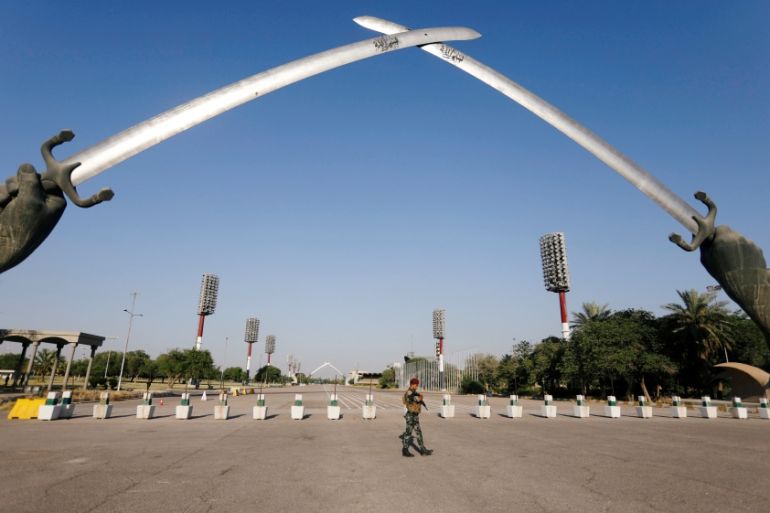Iraq-US strategic dialogue to launch amid tempered expectations
Top-level talks expected in Baghdad demoted to brief online kick-off session due to COVID-19, financial crisis.

Baghdad and Washington are poised to launch strategic talks on Thursday to reset ties after months of tensions.
However, even with a new US-friendly Iraqi premier, a major breakthrough is unlikely.
Keep reading
list of 3 itemsStudents are the ‘backbone’ of Iraq anti-government protests
Who is Mustafa al-Kadhimi, Iraq’s new prime minister?
Due to coronavirus-related travel restrictions, top-level talks expected to take place in Baghdad have been demoted to a brief online kick-off session.
That has tempered expectations for the first strategic dialogue between Iraq and the US in a decade, which will chiefly address the fate of the US-led military coalition, as well as economic and cultural ties.
“The entire US-Iraq bilateral relationship will not be fixed in a single day,” said Robert Ford, an analyst at the Middle East Institute and a US diplomat in Baghdad during the last round of strategic talks in 2008, which ironed out the US drawdown from the occupation that began after the 2003 invasion to topple Saddam Hussein.
“But for once, we seem to have the right people in the right place at the right time,” he said.
Bilateral ties had been at their “coldest” in years, Iraqi and US officials said, following deadly rocket attacks on American military and diplomatic sites since last year.
Tensions skyrocketed following a US strike on Baghdad in January that killed Iranian general Qassem Soleimani and Iraqi commander Abu Mahdi al-Muhandis, prompting Iraqi legislators to vote in favour of ousting all foreign troops.
Washington threatened crippling sanctions.
But the tensions have calmed substantially since Mustafa al-Kadhimi – the country’s former intelligence chief who has close ties to the US and its allies in the region – took the reins as Iraq’s premier in May.
Two Iraqi officials said al-Kadhimi has been invited to the White House this year, a diplomatic olive branch his predecessor Adel Abdul Mahdi never received.
“There was a lack of confidence in the relationship with the previous government, and we’re not there anymore,” one of the officials said.
Troops in the balance
The session, planned for 13:00 GMT, includes a range of diplomatic, military and economic staff from both countries that will split into follow-up committees.
The main event will be the fate of US-led troops, deployed in Iraq from 2014 to head a military coalition fighting the Islamic State of Iraq and the Levant (ISIL or ISIS) group.
“Whatever comes out of the dialogue is going to set the future of our strategic relationship,” an American official from the coalition told the AFP news agency.
“Am I still going to fly surveillance drones or not? Do you still want our intelligence?” he added.
The coalition has already consolidated to just three bases in recent months, down from a dozen, and the talks would likely bring a further drawdown.
“There are no details yet on troop levels, but the US draft on a joint statement mentions a ‘reduction of US forces’,” one senior Iraqi official told AFP.
But a dramatic or sudden drop could hamper the coalition’s efforts to back an Iraqi fightback against ISIL sleeper cells, which have escalated attacks in recent weeks.
Other coalition countries are watching from the sidelines, with no formal role in the negotiations.
Iran and its allies in Iraq, which have vowed to oust US troops, are also keeping a close eye on the talks.
Many reiterated calls for foreign forces to leave, with the spokesman for the pro-Iran Fatah bloc, Ahmed al-Assadi, insisting on a six-month deadline for their departure.
On Monday and Wednesday, two rockets hit near Baghdad airport and the American Embassy after weeks of calm.
But the rhetoric was more tempered than usual, with even the hardline Kataeb Hezbollah saying it would take a formal stance on the talks only after the first session.
“These groups are retrenching, which gives Kadhimi some space with the Americans,” said Ford.
The economy
One area where Iraq may see only limited progress is help for its collapsing economy, which relies almost exclusively on oil exports.
Faltering prices and low demand have drastically shrunk Iraq’s monthly revenues, leaving Baghdad scrambling to pay wages, pensions and welfare to eight million Iraqis.
A US waiver protecting it from American sanctions as it imports gas from neighbouring Iran for its dilapidated power sector is due to expire in late September.
Thursday’s talks are geared to produce long-term support, like infrastructure upgrades using American energy companies and US endorsements for aid from Gulf countries, the World Bank and the International Monetary Fund.
But Iraq needs an immediate crutch.
“The US won’t provide all kinds of cash. They can just offer not to apply sanctions,” said Ford.
“That doesn’t fix Kadhimi’s single biggest problem,” he said, pointing to the lack of hard cash.
|
|